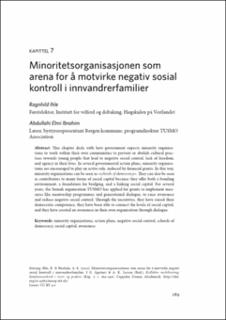Minoritetsorganisasjonen som arena for å motvirke sosial kontroll i innvandrerfamilier
Chapter, Peer reviewed
Published version
Permanent lenke
https://hdl.handle.net/11250/3059588Utgivelsesdato
2022Metadata
Vis full innførselSamlinger
- Import fra CRIStin [3604]
- Institutt for velferd og deltaking [1018]
Originalversjon
10.23865/noasp.168.ch7Sammendrag
Abstract: This chapter deals with how government expects minority organisations to work within their own communities to prevent or abolish cultural practises towards young people that lead to negative social control, lack of freedom, and agency in their lives. In several governmental action plans, minority organisations are encouraged to play an active role, induced by financial grants. In this way, minority organisations can be seen as «schools of democracy». They can also be seen as contributors to many forms of social capital because they offer both a bonding environment, a foundation for bridging, and a linking social capital. For several years, the Somali organisation TUSMO has applied for grants to implement measures like mentorship programmes and generational dialogue, to raise awareness and reduce negative social control. Through the incentives, they have raised their democratic competence, they have been able to connect the levels of social capital, and they have created an awareness in their own organisation through dialogue. Keywords: minority organisations, action plans, negative social control, schools of democracy, social capital, awareness

